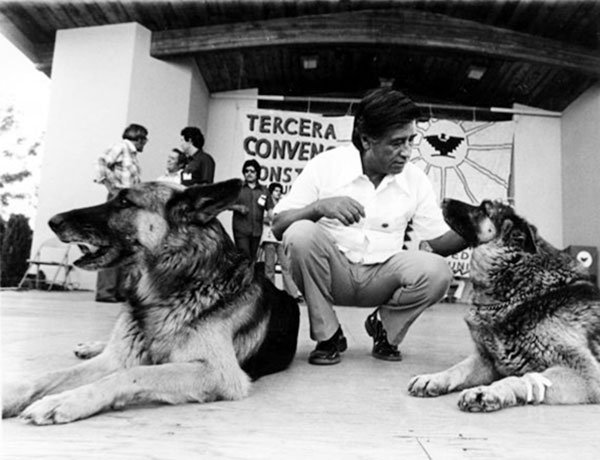
César Chávez (1927–1993)—civil rights, Latino and farm labor leader—was a genuinely religious and spiritual figure as well as a community organizer and social entrepreneur, a champion of nonviolent social change, and a crusader for the environment. He also deeply loved his two German Shepherds, Boycott and Huelga (“strike”), dogs he was given in the 1970s and trained himself.

The German Shepherds provided security for Chávez and his family at La Paz, the United Farm Workers’ headquarters in Keene, Calif. They went almost everywhere with him, including on the road when he traveled by car. He credited them with deepening his belief that without exception, all lives are valuable.
The dogs even helped deepen his commitment to vegetarianism. As he said, “I became a vegetarian after realizing that animals feel afraid, cold, hungry and unhappy like we do. I feel very deeply about vegetarianism and the animal kingdom. It was my dog Boycott who led me to question the right of humans to eat other sentient beings. The basis for peace is respecting all creatures.”
Chávez also was committed to animal rights. “Kindness and compassion towards all living beings is a mark of a civilized society,” he said. “Racism, economic deprival, dog fighting and cock fighting, bullfighting, and rodeos are all cut from the same defective fabric: violence.”
GET THE BARK NEWSLETTER IN YOUR INBOX!
Sign up and get the answers to your questions.
In Defense of Animals awarded him their lifetime achievement award in 1993 for the “profound appreciation of all he has done and achieved for his fellow beings, both human and nonhuman alike.” In his acceptance speech, he said that the basis for peace was to respect all creatures. “We need in a special way to work twice as hard to make all people understand that animals are fellow creatures. We must protect them and love them as we love ourselves.”
Before Chávez died in his sleep on April 23, 1993, he had told his brother Richard that he wanted his body to be put in a pine coffin and interred in the rose garden near Boycott and Huelga’s final resting place—a lasting vision maintained in what now is the Memorial Garden at the César E. Chávez National Monument in Keene.